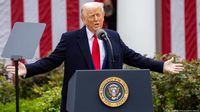As Donald Trump marks the 100-day milestone of his second term as president, the landscape of American politics reveals a complex and tumultuous picture. Following a resounding victory that saw him reclaim the presidency while his party retained control of both the House and Senate, Trump had initially envisioned a legislative agenda that would rewrite immigration laws, slash regulations, and fulfill his campaign promises. However, the reality has been starkly different.
Since taking office in January 2025, Trump has issued an unprecedented 135 executive orders, significantly bypassing Congress in a manner not seen during his first term. In fact, the current Congress has managed to pass only six bills, five of which have been signed into law, marking the fewest legislative accomplishments for any president in the first 100 days in over seven decades, according to a TIME analysis.
To put this into perspective, Trump had already signed 30 bills by the same point in his first term. Former President Joe Biden signed 10 bills in his first 100 days, while Barack Obama and George W. Bush signed 14 and seven, respectively. The current legislative output is a clear indication of a shift towards consolidating presidential power.
Of the six bills passed, three were aimed at rolling back regulations established by the Biden Administration, including measures related to environmental protections and cryptocurrency taxation. Additionally, Congress managed to pass a stopgap funding bill to keep the government running, alongside the Laken Riley Act and the Take It Down Act. The latter, which is expected to be signed into law soon, criminalizes non-consensual deepfake porn, requiring platforms to remove such content within 48 hours of notice.
Trump's reliance on executive power has drawn mixed reactions from lawmakers. Senate Minority Leader Chuck Schumer expressed concern, stating, "The executive always wants to control more things, but in the past, members—whether it's a Democratic president or Republican president—have always resisted that. It didn't happen this year for the first time. They just bowed down to the President, and they're surrendering their power." This sentiment reflects a broader apprehension about the implications of Trump's approach on the balance of power.
As Trump continues to push for what he calls his "one big, beautiful bill," which aims to extend the 2017 tax cuts and expand military spending, divisions within the Republican Party have surfaced. Senate Republicans have set a modest target for budget cuts, while House Republicans are under pressure to find significant savings, leading to tensions over potential cuts to social safety net programs.
The political atmosphere surrounding Trump's presidency has been further complicated by growing dissatisfaction among the American public. A recent AP-NORC poll indicates that many Americans disapprove of Trump's aggressive push to implement his agenda, with nearly twice as many respondents believing he is focusing on the wrong priorities compared to those who feel he is on the right track. While approximately 70% of Republicans view Trump favorably, only half believe he is prioritizing the right issues.
In addition to domestic challenges, Trump’s foreign policy has also attracted scrutiny. The president's aggressive stance on tariffs, particularly targeting China, has led to a significant disruption in trade relations. The S&P 500 has fallen about 8% under Trump's administration, marking the worst performance for the stock market in the first 100 days of a presidency since Gerald Ford in 1974.
Consumer confidence has also taken a hit, plummeting to its lowest level since the onset of the COVID-19 pandemic. The Conference Board's consumer confidence index dropped to 86.0 in April 2025, down from 93.9 in March, reflecting pervasive pessimism about future economic conditions. Concerns about job security and economic stability are prevalent, with a notable share of consumers expecting fewer jobs in the coming months.
Meanwhile, Trump's immigration policies have remained a focal point of his administration. He has signed a new executive order targeting sanctuary cities that do not comply with federal immigration laws, threatening to withhold federal funding from those jurisdictions. So far, approximately 139,000 individuals have been deported, with plans to increase that number significantly.
Internationally, Trump's comments regarding Greenland have stirred controversy. His administration has expressed interest in acquiring the semi-autonomous territory, which is officially part of Denmark. This has drawn criticism from Danish officials, who have emphasized that Greenland is not for sale. The situation highlights the complexities of Trump's foreign policy and its impact on diplomatic relations.
As Trump prepares to hold a rally in Michigan to commemorate his first 100 days, the administration is expected to announce new tariff structures aimed at easing some import duties on foreign parts used in U.S. auto manufacturing. The automotive industry has been particularly affected by Trump's protectionist trade policies, with General Motors recently pulling its full-year forecast amid uncertainty over tariffs.
The road ahead for Trump's presidency remains fraught with challenges. While he continues to assert his authority through executive action, the increasing dissatisfaction among the electorate, coupled with internal divisions within the Republican Party, could complicate his efforts to enact his legislative agenda. As the political landscape evolves, all eyes will be on how Trump navigates these obstacles in the coming months.






